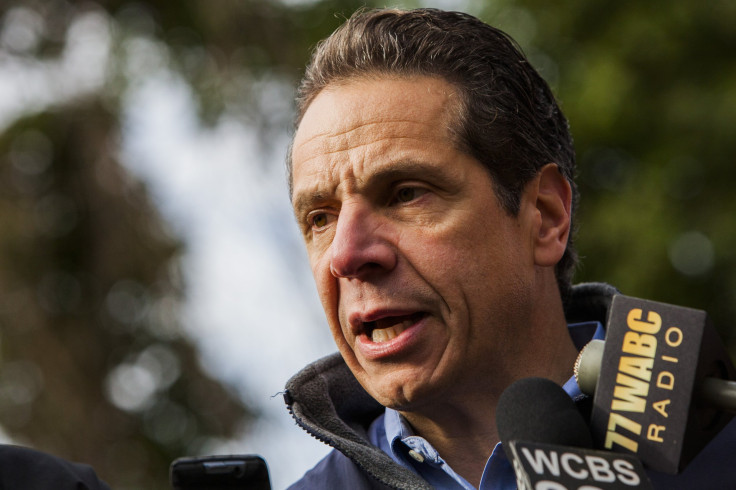New York Gov. Andrew Cuomo Gave Bond Deals To His Wall Street Donors, Despite Federal Rules

New York Gov. Andrew Cuomo has since 2012 taken in more than $131,000 in campaign contributions from three major financial firms that were then tapped by his administration to manage state bond work, according to an International Business Times review of campaign finance documents and state bond prospectuses. The Democratic governor accepted the money -- and his officials handed out the government business without competitive bids -- despite federal rules that bar campaign contributors from receiving taxpayer-financed state bond work.
Last week, Cuomo officials designated the three banks that contributed the campaign funds -- JPMorgan Chase, Citigroup and Bank of America -- as the dealers for a $33 million bond issue, enabling the firms to reap lucrative fees. That came on top of the Cuomo administration assigning the firms to manage a $68 million bond issue last fall, even as federal law enforcement officials were investigating allegations that New York lawmakers were doing favors for political donors.
Federal rules bar states from awarding bond work to parties who have donated to gubernatorial campaigns within the last two years (more than $86,000 of the campaign cash from the firms flowed to Cuomo in the last two years). The rules aim to prevent financial firms from gaining influence over officials who have the power to select which firms receive the lucrative bond business. The rules explicitly seek to stop financial companies from circumventing those strictures: They prohibit firms from channeling contributions to bond overseers through PACs, which are giant pools of money distributed to multiple campaign war chests.
“The pay-to-play rules are very clear,” said Craig Holman, an ethics expert at the watchdog group Public Citizen. “If Andrew Cuomo’s receiving any money from a PAC controlled by a municipal dealer, he’d be in violation of pay-to-play rules.”
Cuomo’s office declined to answer IBTimes’ questions. Bank of America, Citigroup and JPMorgan Chase said they are in compliance with the federal rules. Though the banks acknowledge that their PACs have contributed to Cuomo’s gubernatorial campaign and also acknowledge that they received state bond work from the Cuomo-controlled New York State Housing Finance Agency, they maintain that the individual bond dealers did not contribute to the PAC that gave to Cuomo.
“Citi has two separate PACs, a state and a federal,” said Citigroup spokeswoman Molly Meiners. “To the extent anyone on our Muni team donates money, they are required to give to our Federal PAC only, which has never given to Cuomo.”
Bank of America and JPMorgan Chase echoed that portrayal.
The three banks declined to identify any of the professionals who work on their state and municipal finance deals, making it impossible to verify their claims.
Campaign finance experts and regulators say the banks’ defense is dubious in any case, telling IBTimes that the federal rule bars financial institutions from using indirect means to achieve what is explicitly prohibited.
“Circumvention of the rule through indirect contributions is prohibited,” said Lynnette Kelley, executive director of the Municipal Securities Rulemaking Board.
That interpretation is backed up by the Securities and Exchange Commission, which states that those prohibited from donating include "individuals who have an economic interest in seeing that the dealer is awarded municipal securities business.” The rule itself says it covers “any political action committee controlled” by the bond dealer in question.
Former SEC Chairman Arthur Levitt, who oversaw the implementation of the original rules, questioned the banks’ argument.
“If the entity that does the business has any relationship to the business and somehow or other gets campaign contributions to a political entity that controls the award of that business, it's certainly a violation of the spirit of the rule,” he said.
The federal “pay-to-play” rule does contain one exception: If bond contracts are awarded by competitive bidding, then the prohibition on campaign contributions does not apply. But a spokeswoman for Cuomo’s New York State Housing Finance Agency, Catie Marshall, told IBTimes that none of the deals in question had been awarded via competitive bid. The agency was headed until January by Bill Mulrow, a former Blackstone lobbyist who is now the governor’s chief of staff.
The bond deals were announced by the Cuomo administration amid a sprawling federal corruption probe of Albany lawmakers’ relationships with political donors in the real estate industry. That investigation has already resulted in the arrest of the state legislature’s top Republican and top Democrat. In February, IBTimes reported that a Cuomo donor at the center of the probe saw his real estate firm receive subsidies from the same state housing agency that gave bond work to Cuomo’s financial industry donors.
As state attorney general five years ago, Cuomo made headlines prosecuting so-called “pay-to-play” cases at New York’s pension fund. His investigations ultimately led SEC officials to subject pension funds to the same “pay-to-play” rules that govern bond deals.
Those original rules, cemented in 1994, are now at issue in the Cuomo administration’s new bond offerings.
Michael Kink, the executive director of the Strong Economy for All Coalition, which has criticized Cuomo’s ties to the financial industry, slammed the governor for accepting the donations and then awarding the bond work to the banks.
“New Yorkers deserve careful compliance with rules against pay-to-play transactions from government officials,” Kink told IBTimes. “These donations are the latest indication that Albany hasn't really changed under the Cuomo administration -- and that top officials are so eager to help big-money Wall Street campaign donors that they'll bend or break rules, regulations and laws in the process."
© Copyright IBTimes 2024. All rights reserved.





















